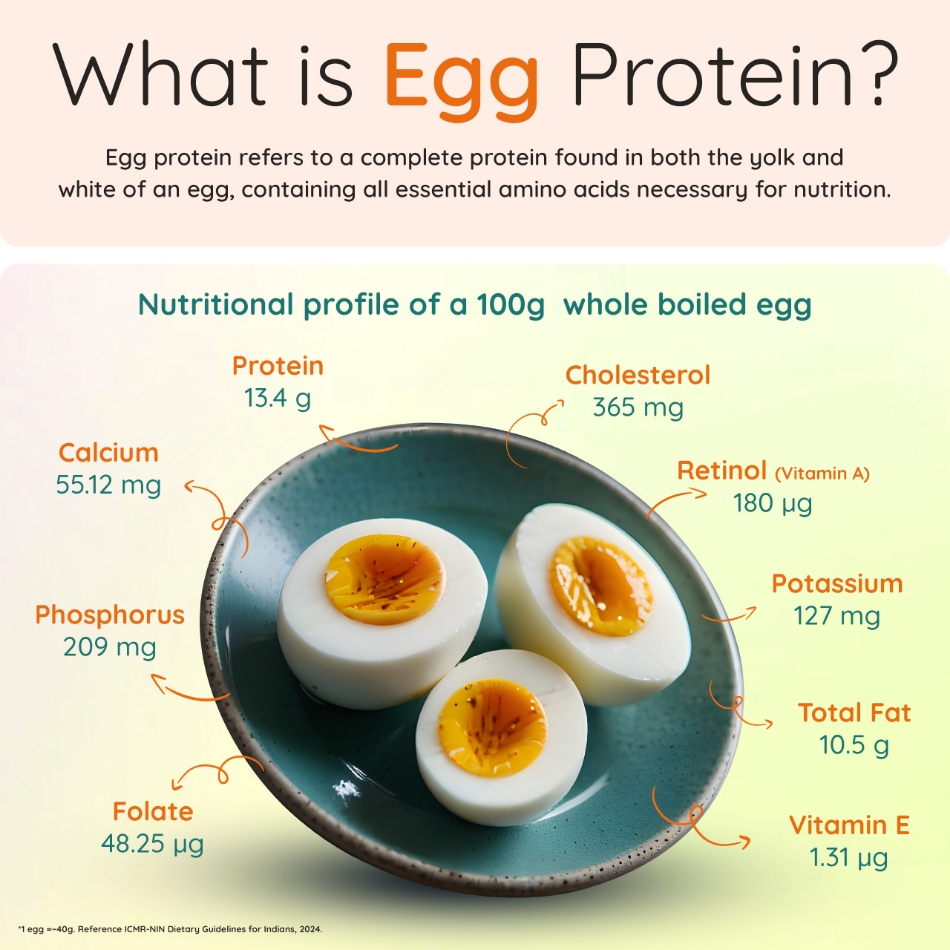How Much Protein is in the Egg?
Discover the protein power of eggs! Learn about their high-quality protein content, health benefits, and how to maximize their nutritional value in your diet.
Discover the protein power of eggs! Learn about their high-quality protein content, health benefits, and how to maximize their nutritional value in your diet.

Table of Contents
We live in a world where “quick and easy” is the way to go. Deadlines loom, commutes crawl, and finding time for a decent breakfast feels like a Herculean task. But what if we told you that a nutritional powerhouse is hiding in plain sight, ready to fuel your day in minutes?
That’s right, we’re talking about eggs – nature’s complete protein-packed gift. Eggs are the ultimate breakfast hack, offering a potent dose of protein that keeps you feeling full and energized long after you’ve left the house. Imagine you’re getting late, but you do not want to miss on your breakfast. You whip up a quick egg scramble packed with colourful veggies and a sprinkle of cheese. Suddenly, your morning routine transforms from a frantic scramble into a moment of delicious self-care where you are feeding your body with much needed egg protein.
So whether you are a fitness enthusiast or just someone who wants to add more protein to their diet, you have come to the right place. This guide will dive deep into the nutritional benefits, explore creative ways to incorporate eggs into your diet, and equip you with the knowledge to make informed choices for a healthier, more energized you.

You may be wondering what exactly is egg protein. The term generally refers to the protein composition from both the egg white (albumen) and yolk. While it is common knowledge to associate the protein content with just the egg whites, it is also essential to note that almost 15-17% of the egg protein comes from the humble yolk. A single egg approximately weighs 40g.
Refer to this list for a comparison to understand the distinction between the protein content of a boiled egg, the egg whites and the yolk. Below are the protein values per 100g in each of the components:
Here, we can further understand that it is not only the albumen but also the yolk that contributes to the protein markup of the egg. While the egg white is a high-quality protein source compared to the yolk, yolk contains vitamins like A, D & E, K, B1, B2, B5, B6, B9, and B12 along with egg fat which acts like a vehicle for the fat-soluble vitamins to be absorbed. Eggs also contain choline which is an essential nutrient for regulating vital bodily functions along with minerals and trace elements such as phosphorus, calcium, potassium, sodium, copper, iron, magnesium, manganese, selenium, and zinc.
Following is the nutritional profile of a whole boiled egg, weighing 100 g:
| Nutrient | Unit |
| Calcium | 55.12 mg |
| Phosphorus | 209 mg |
| Folate | 48.25 µg |
| Cholesterol | 365 mg |
| Retinol | 180 µg |
| Potassium | 127 mg |
| Total Fat | 10.5 g |
| Vitamin D3 | 0.74 µg |
| Vitamin E | 1.31 µg |
The egg nutrition value expands through amino acids, minerals, vitamins and fats. Here are some of the egg protein benefits that you may derive from them:
1. Helps maintenance of muscle mass
Incorporating adequate amount of egg protein as a part of a balanced diet has been associated with improved skeletal muscle health.
2. Supports growth & development in Children
It is a nutrient-rich food. Helps meet daily protein needs of children.
3. Helps provide satiety
Eggs are filling and allow for satiety when included in your meals. This may help you feel fuller for long, which may curb the need to reach out for unnecessary binging. Hence, it makes it easier for you to manage your weight.
Adding egg protein to your meals is much easier than you think. Well, it doesn’t have to be just a boiled egg every time. Think creatively and explore the ingredients for the versatile staple that it is. For breakfast you may fashion some scrambled eggs, a spicy Anda Bhurji with whole wheat roti or a masala omelette stuffed with vegetables. For lunch enjoy a comforting Egg Curry with steamed rice or a flavourful Egg Biryani. For dinner, indulgent in shakshuka with bread or a simple Egg Drop Soup. Whichever route you choose, the egg protein benefits will never disappoint.